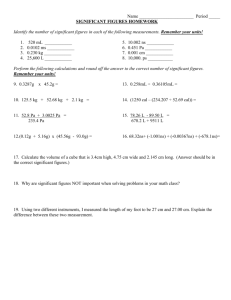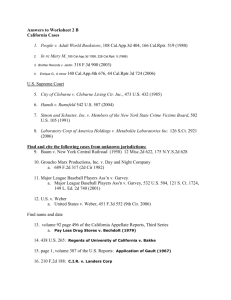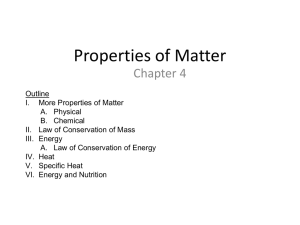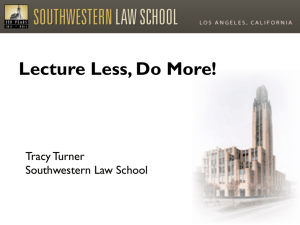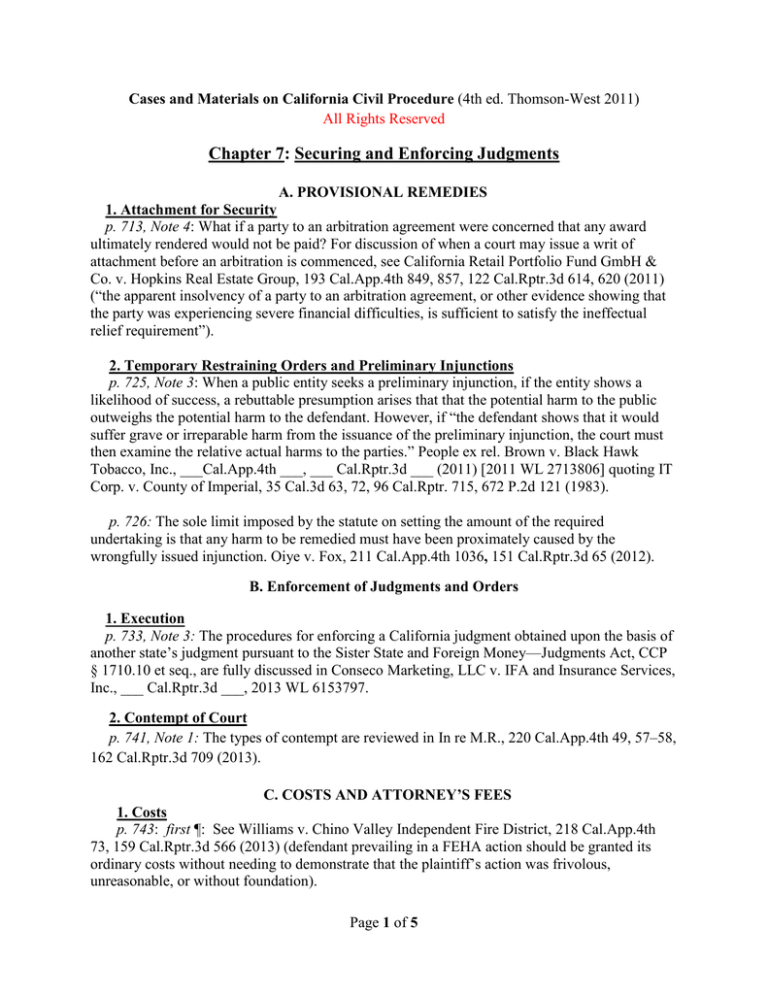
Cases and Materials on California Civil Procedure (4th ed. Thomson-West 2011)
All Rights Reserved
Chapter 7: Securing and Enforcing Judgments
A. PROVISIONAL REMEDIES
1. Attachment for Security
p. 713, Note 4: What if a party to an arbitration agreement were concerned that any award
ultimately rendered would not be paid? For discussion of when a court may issue a writ of
attachment before an arbitration is commenced, see California Retail Portfolio Fund GmbH &
Co. v. Hopkins Real Estate Group, 193 Cal.App.4th 849, 857, 122 Cal.Rptr.3d 614, 620 (2011)
(“the apparent insolvency of a party to an arbitration agreement, or other evidence showing that
the party was experiencing severe financial difficulties, is sufficient to satisfy the ineffectual
relief requirement”).
2. Temporary Restraining Orders and Preliminary Injunctions
p. 725, Note 3: When a public entity seeks a preliminary injunction, if the entity shows a
likelihood of success, a rebuttable presumption arises that that the potential harm to the public
outweighs the potential harm to the defendant. However, if “the defendant shows that it would
suffer grave or irreparable harm from the issuance of the preliminary injunction, the court must
then examine the relative actual harms to the parties.” People ex rel. Brown v. Black Hawk
Tobacco, Inc., ___Cal.App.4th ___, ___ Cal.Rptr.3d ___ (2011) [2011 WL 2713806] quoting IT
Corp. v. County of Imperial, 35 Cal.3d 63, 72, 96 Cal.Rptr. 715, 672 P.2d 121 (1983).
p. 726: The sole limit imposed by the statute on setting the amount of the required
undertaking is that any harm to be remedied must have been proximately caused by the
wrongfully issued injunction. Oiye v. Fox, 211 Cal.App.4th 1036, 151 Cal.Rptr.3d 65 (2012).
B. Enforcement of Judgments and Orders
1. Execution
p. 733, Note 3: The procedures for enforcing a California judgment obtained upon the basis of
another state’s judgment pursuant to the Sister State and Foreign Money—Judgments Act, CCP
§ 1710.10 et seq., are fully discussed in Conseco Marketing, LLC v. IFA and Insurance Services,
Inc., ___ Cal.Rptr.3d ___, 2013 WL 6153797.
2. Contempt of Court
p. 741, Note 1: The types of contempt are reviewed in In re M.R., 220 Cal.App.4th 49, 57–58,
162 Cal.Rptr.3d 709 (2013).
C. COSTS AND ATTORNEY’S FEES
1. Costs
p. 743: first ¶: See Williams v. Chino Valley Independent Fire District, 218 Cal.App.4th
73, 159 Cal.Rptr.3d 566 (2013) (defendant prevailing in a FEHA action should be granted its
ordinary costs without needing to demonstrate that the plaintiff’s action was frivolous,
unreasonable, or without foundation).
Page 1 of 5
What if the trial court dismisses an action on the basis that it does not have subject matter
jurisdiction over the claim? May the court award costs as pursuant to its judgment of dismissal?
Compare Gutting v. Globe Indemnity Co., 119 Cal.App. 288, 6 P.2d 298 (no power to award
costs if no subject matter jurisdiction over action) with Brown v. Desert Christian Center, 193
Cal.App.4th 733, 744, 122 Cal.Rptr.3d 590, 598 (2011) (court had power to award costs because
“judgment of dismissal and the proceedings on which it depended were based on the trial court's
jurisdiction to determine its own jurisdiction”).
p. 743, second full paragraph: Marx v. General Revenue Corp., 568 U.S.___, 133 S.Ct.
1166, 185 L.Ed.2d 242 (2013) (because costs provision of the Federal Debt Collection Practices
Act is not contrary to FRCP 54(d)(1), which governs awards of costs, and thus does not displace
a district court's discretion to award costs to a prevailing party under the rule, a district court may
award costs to prevailing defendants in FDCPA cases without finding that the plaintiff brought
the case in bad faith).
p. 744: What if a lawyer wants to recover the expenses of creating a PowerPoint presentation
for the closing argument? One court disallowed this expense on the grounds that it was merely
reasonably helpful, but not reasonably necessary, to the jury. Martinez v. Brownco Construction
Co., 203 Cal.App.4th 507, 136 Cal.Rptr.3d 899 (2012).
p. 749, Notes 2 and 3: The California Court of Appeal addressed when to award ordinary
costs as distinguished from attorney’s fees and expert witness fees in a FEHA case, Williams v.
Chino Valley Independent Fire District, ___ Cal.Rptr.3d ____, 2013 WL 3817004. The trial
court had disallowed all costs because the losing plaintiff’s case was not frivolous, unreasonable
or groundless (citing federal law, which is often used for precedent in FEHA matters, for
recovery of fees for defendants prevailing in civil rights cases). The Court of Appeal reversed, in
an opinion sorting out state and federal precedent, because it held that the prevailing defendant
was entitled to ordinary costs without applying the higher standard for recovery of attorney’s
fees or expert witness fees.
2. Attorney’s Fees
p. 758, Note 1: Serrano v. Stefan Merli Plastering Co., 52 Cal.4th 1018, 132 Cal.Rprtr.3d 358,
262 P.3d 568 (2011) (distinguishing Joshua S.). See also Norberg v. California Coastal
Commission, ___ Cal.Rptr.3d ___, 2013 WL 6047893 (party not entitled to attorney’s fees after
it prevailed in court to get set aside certain conditions the Coastal Commission had imposed on a
residential permit application because the success did not confer a substantial benefit on either
the general public or a large number of persons and the financial burden of the litigation was not
out of proportion to party’s individual stake).
p. 759, Note 3: What if a plaintiff voluntarily dismisses the action? Has the defendant
prevailed? Salehi v. Surfside III Condominium Owners' Association, 200 Cal.App.4th 1146, 132
Cal.Rptr.3d 886 (2011) (yes).
p. 760 n. 5: In Graham v. DaimlerChrysler Corp., 34 Cal.4th 553, 21 Cal.Rptr.3d 331, 101
P.3d 140 (2004), the California Supreme Court imposed a prerequisite in catalyst cases that no
fee could be awarded under CCP § 1021.5 unless the plaintiff had made an attempt to settle the
Page 2 of 5
matter prior to filing an action. The Court has also determined that in a non-catalyst case, the
plaintiff is not required to make an attempt to settle in advance in order to be eligible for
attorney's fees as a private attorney general. That a plaintiff might choose not to propose or
accept a reasonable settlement offer is a circumstance that potentially weighs against an award of
fees, but it is not an absolute requirement if the plaintiff does become the prevailing party by
obtaining court-ordered change in the parties’ legal relationship. Vasquez v. State, 45 Cal.4th
243, 85 Cal.Rptr.3d 466, 195 P.3d 1049 (2008).
p. 769, Note 1: What if a law firm is successfully represented by someone acting “of counsel”
to the firm? The Court of Appeal concluded that the answer was no, because a law firm and “of
counsel” constitute a single, de facto firm. Sands & Associates v. Juknavorian, 209 Cal.App.4th
1269, 147 Cal.Rptr.3d 725 (2012). But see Healsburg Citizens for Sustainable Solutions v. City
of Healdsburg, 206 Cal.App.4th 988, 142 Cal.Rptr.3d 250 (2012) (attorney who was also named
party could be awarded fees under CCP § 1021.5; exclusions for pro se representation under
Civil Code § 1717 were distinguished).
p. 770, new Note 3.5: There can be no more than one prevailing party for purposes of
awarding fees under Civil Code § 1717. Frog Creek Partners, LLC v. Vance Brown, Inc., 206
Cal.App.4th 515, 141 Cal.Rptr.3d 834 (2012). See also Cussler v. Crusader Entertainment,
LLC, 212 Cal.App.4th 356, 150 Cal.Rptr.3d 895 (2012) (no prevailing party under Civil Code §
1717).
In holding that an action to avoid enforcement of a contract is an action “on a contract” within
the meaning of section 1717, one Court of Appeal noted:
“An action (or cause of action) is ‘on a contract’ for purposes of section 1717 if (1) the
action (or cause of action) ‘involves' an agreement, in the sense that the action (or cause
of action) arises out of, is based upon, or relates to an agreement by seeking to define or
interpret its terms or to determine or enforce a party's rights or duties under the
agreement, and (2) the agreement contains an attorney fees clause.”
Eden Township Healthcare District v. Eden Medical Center, 220 Cal.App.4th 418, 427, 162
Cal.Rptr.3d 932, 939 (2013) (quoting Douglas E. Barnhart, Inc. v. CMC Fabricators, Inc., 211
Cal.App.4th 230, 241, 162 Cal.Rptr.3d 440, 449 (2012)). Eden Township provides many
examples of actions which were held to be “on a contract.”
p. 770, Note 4: Assume that A and B were parties to a contract, which provided for an award
of attorney’s fees to the prevailing party in the event of a dispute. After a dispute arose and an
action filed, A rejected B’s pretrial settlement offer under CCP § 998. A ultimately prevailed on
the merits, but was not awarded as much as B’s offer. Section 998 requires that B be treated as if
it were the prevailing party for purposes of postoffer costs, and thus B would be entitled to an
award of postoffer attorney's fees pursuant to the contract. SCI Funeral Services, Inc. v. Five
Bridges Foundation, 203 Cal.App.4th 549, 137 Cal.Rptr.3d 693 (2012).
p. 770, Note 4: Plaintiff sued Defendant in state court for breach of warranty. Defendant
argued successfully that the state court lacked subject matter jurisdiction because the claim,
which arose under federal copyright law, had to be adjudicated in federal court. Defendant then
moved for attorney’s fees in state court under Civil Code § 1717 as the prevailing party. After
Page 3 of 5
reviewing authority both supporting and contrary to its position, the Court of Appeal concluded
that the trial court had the authority to award attorney’s fees pursuant to the contract even though
the defendant prevailed on a procedural matter which demonstrated that the trial court did not
have subject matter jurisdiction over the substantive claim. Kandy Kiss of California, Inc. v.
Tex-Ellent, Inc., 209 Cal.App.4th 604, 146 Cal.Rptr.3d 899 (2012), rev. granted and opinion
superseded, 151 Cal.Rptr.3d 105 (Cal. Jan 16, 2013).
p. 770, Note 4, last ¶: Although Cal.Civ. Code § 1717 does not apply to tort or other
noncontract claims, the parties to a contract may agree that one or more of them shall recover
their attorney fees if they prevail on a noncontract claim. Because the right to recover those fees
depends solely on the contractual language, section 1717 does not make a unilateral fee
provision reciprocal on noncontract claims. Brown Bark III, L.P. v. Haver, ___Cal.App.4th ___,
___ Cal.Rptr.3d ___, 2013 WL 5192233.
p. 771, Note 4: Under Civil Code § 1717, the prevailing party is the one who obtains the
“greater relief,” rather than merely prevailing on a significant issue. However, the prevailing
party is entitled to attorney’s fees at prevailing market rates rather than merely the costs incurred
in providing the legal services. In re Tobacco Cases I, 193 Cal.App.4th 1591, 124 Cal.Rptr.3d
352 (2011).
p. 771, Note 5: What if the defendant has prevailed in an action where some of the relevant
statutes allow an award of fees only to a prevailing plaintiff and another statute allows a fee
award to a prevailing defendant? See Jankey v. Lee, 55 Cal.4th 1038, 150 Cal.Rptr.3d 191, 290
P.3d 187 (2012) (fee under state law is mandatory for either prevailing party and is not
preempted by federal law under Americans with Disabilities Act). For a case examining one-way
and two-way fee shifting statutes under the California Labor Code, see Kirby v. Immoos Fire
Protection, Inc., 53 Cal.4th 1244, 140 Cal.Rptr.3d 173, 274 P.3d 1160 (2012). A two way fee
statute does not apply when a one way fee statute applies. Aleman v. Airtouch Cellular, 209
Cal.App.4th 556, 146 Cal.Rptr.3d 849 (2012).
p. Note 5: For a case examining one-way and two-way fee shifting statutes under the
California Labor Code, see Kirby v. Immoos Fire Protection, Inc., 2012 WL 1470313.
p. 772, Note on Adjusting the Lodestar in State and Federal Court: Although a negative
multiplier or other reduction from the lodestar is permissible, the court may not rely on improper
reasons. For example, the court may reduce a lodestar based either on the fact that the defendant
is a government agency with limited public funds or on the fact that the plaintiff’s attorneys
accepted the case on a pro bono basis. Rogel v. Lynwood Redevelopment Agency, 194
Cal.App.4th 1319, 125 Cal.Rptr.3d 267 (2011).
p. 772: “[G]enerally no award of attorney fees as “an element of the costs of suit” under Code
Civ. Proc., § 1033.5, subd. (a)(10), and section 1717 can be made to a litigant who has not also
been determined to be the prevailing party under section 1032.” Zintel Holding, LLC v. McLean,
209 Cal.App.4th 431, 438 n.1, 147 Cal.Rptr.3d 157, 163 n. 1 (2012).
Page 4 of 5
p. 773, Note on Adjusting Lodestar in State and Federal Court: Cates v. Chiang, 213
Cal.App.4th 791, 153 Cal.Rptr.3d 285 (2013) (applying Ketchum in reviewing 1.85 enhancement
to the lodestar).
See also In re Tobacco Cases, 216 Cal.App.4th 570, 582, 156 Cal.Rptr.3d 755, 764 (2013)
(although lodestar usually uses an hourly rate fee for comparable legal services in the trial
court’s local area, the court may make an exception when the prevailing party shows it was
impracticable to use local counsel).
p. 773, last ¶: Accurate record-keeping is a vital pre-requisite to obtaining a court-ordered
award of attorney’s fees. See Ellis v. Toshiba America Information Systems, Inc., 218
Cal.App.4th 853, 160 Cal.Rptr.3d 557 (2013) (affirming denial of nearly all of the requested fee
award--which originally was close to $24 million--because the attorney’s billing records were
inconsistent, contained omissions, inaccurate and contradictory entries, claimed obviously
excessive hours and included work which should have been handled by paralegals or other lower
paid professionals).
Page 5 of 5

